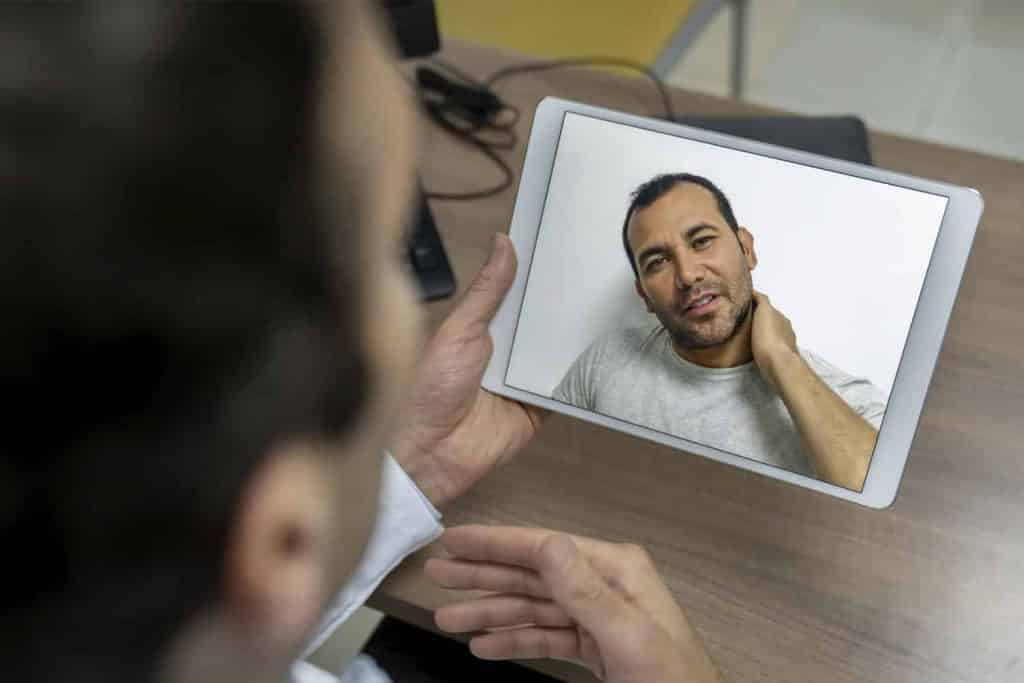Typically, teleneurology patients are seen via telemedicine at a community hospital or in your home. Telemedicine is a means of delivering health care services remotely. This can occur over two-way interactive video, sometimes with a special device at the hospital or clinic, or on your smartphone or tablet at home.
Teleneurology hospital patients are seen at the request of the hospital for a specific need or condition, and are not by appointment. View a map of hospital locations where teleneurology is offered.
Benefits of Telemedicine:
- It can bring previously unavailable health care services to you and your community.
- It can improve your continuity of care because your local health care provider can be with you when you are seeing a telemedicine clinician.
- It provides convenient access for those who have transportation difficulties for medical appointments.
Frequently Asked Questions:
Q: What can I expect during a telemedicine consultation?
A: If you are seen at a hospital room, the staff will bring in a TV monitor to connect with a health care provider at a remote location. With assistance, you and the telemedicine clinician can speak to each other as if you were in the same room. To respect your privacy, only the telemedicine clinician, your local health care practitioner, and your approved friends and family are the only ones present. If there is a need for additional personnel to be present, your permission will be asked. The local health care provider present in the room with you will introduce you and explain your symptoms to the telemedicine clinician, who will then ask you some questions. The telemedicine clinician may ask the health care practitioner in the room with you to assist in the examination. A discussion will follow to decide the next steps. If you are seen at home, it will just be you and the provider on a two-way video call, and your visit will be a discussion between the two of you, much like if you were in the exam room at the doctor’s clinic.
Q: How can the telemedicine clinician examine me when we are not in the same location?
A: The telemedicine clinician may ask your health care practitioner to assist. There are instruments specially designed for telemedicine that may help the clinician to see and hear better.
Q: How is my privacy protected?
A: Telemedicine sites and applications are linked by dedicated, encrypted lines to protect privacy. Your consultation is conducted in a private room with closed doors.
Q: What is the cost to use telemedicine? Does insurance cover telemedicine consultations?
A: Many insurers, including Medicaid, are covering most telemedicine consultations. You should contact your insurance provider to see if telemedicine is a covered benefit.
Telemedicine Physicians

Aidan I. Azher, MD
Telemedicine Neurology

Andrew D. Barreto, MD
Telemedicine Neurology

Kyrillos R. Eskander, MD
Telemedicine Neurology

Salman Farooq, MD
Telemedicine Neurology

Amanda L. Jagolino-Cole, MD
Telemedicine Neurology

Ashutosh Kaushal , MD
Telemedicine Neurology

Khalid Khalid, MD
Telemedicine Neurology

Kamayani Khare, MD
Telemedicine Neurology

Sishir Mannava, MD
Telemedicine Neurology

Bharti Manwani, MD, PhD
Telemedicine Neurology

Louise D. McCullough, MD
Telemedicine Neurology

Narges Moghimi, MD
Telemedicine Neurology

Maria A. Parekh, MD
Telemedicine Neurology

Sri Raghav S. Sista, MD
Telemedicine Neurology





